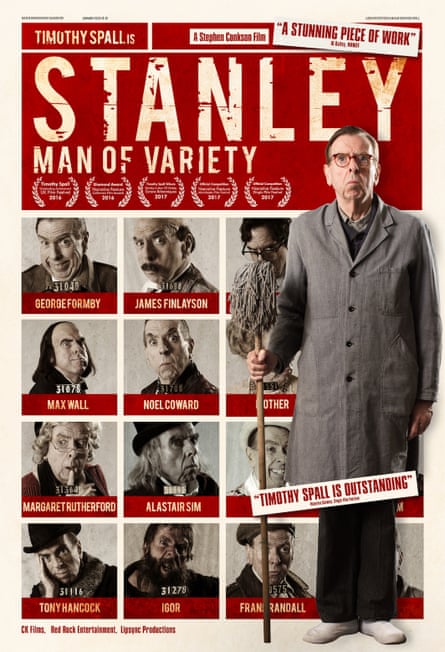Timothy Spall has often played characters that stick in the mind – from Barry in the ITV (later BBC) hit series Auf Wiedersehen, Pet to his award-winning performance as the great British painter in Mike Leigh’s 2014 film, Mr Turner. But Spall’s latest film goes several steps further.
In Stanley, A Man of Variety released in cinemas next month, he concocts a blistering string of recreations of several of the great comic variety acts of the past, incuding Max Wall, George Formby and Noël Coward. It is an extraordinary tour de force, but not a comfortable one to watch. Spall and his collaborator on the film, the director and writer Stephen Cookson, have a deeply unsettling argument to make and they do not hold back.
“There is an appearance of cosy fun and jollity in these characters, but I now realise that as a child I always had a strong sense there was something sinister about their affability, or at least a wretched quality to it,” he told the Observer.

Spall, 61, suspects that although it might look at first sight as if the modern British comic tradition, running down from the raucous stars of the music hall to the farcical antics of Alan Partridge, is peopled by a succession of lovable comic characters, the truth is more troubling. Whether the comic personas are bold and coarse, like Max Miller, or deadpan and wry, like Tony Hancock, they only really have a single buried message to bring their audience: the truth that life is cruel and lonely.
“What I particularly wanted to get across in Stanley, A Man of Variety was this massive feeling I have about what it was really like to grow up in the postwar era. The point is, without wanting to get too intellectual about it, beyond all this affability there is a disquieting side. In fact, all the jolliness is underpinned by it.”
It is a sombre thread running through postwar popular entertainment that Spall accepts could be called “British noir”, or perhaps more specifically, “English noir”.
“There is the sense of a lost empire behind it and a fundamental brutality. I still associate that world with the horrible idea of the iron lung, with the cream tiles of a clinic, the upsetting ordinary horror of austerity during that period. A world with a normal yet tragic quality to it.”
The film centres on the psychopathic personality of Stanley, also played by Spall. He is a prisoner who seems unsure of his crime and, increasingly, also of his identity. The shape of the story, its dialogue and the impersonations were developed by Spall with Cookson after long sessions of watching YouTube footage of the original performers.
“I had worked with Steve before on a film I made with Brenda Blethyn called My Angel, and he brought me another script,” said Spall. “We didn’t end up doing that one, but there were elements we kept talking about. It was a vehicle for one person and for someone incarcerated. We talked a lot about the films we had seen as children. Steve had seen a lot of classic comedy and I was particularly interested in the idea of showing what goes on inside the imagination of the ignored person, of the terrible things that might happen in the mind of what you might call a Mr Beige.”

The film has conscious echoes of the black Ealing comedy Kind Hearts and Coronets, in which Alec Guinness plays all the victims of Dennis Price’s imprisoned killer. But Spall had another source of inspiration.
“I kept thinking of the atmosphere of Eraserhead, the 1977 David Lynch film,” he said. “And I also did not want it to be a simple set of comic turns from me. Each character’s appearance in the story had to be a way through to the next stage.”
Cookson and Spall had “no masterplan”, however, and writing soon “hit a brick wall”. Discarding some of the characters, they took Stanley out of prison and brought in a potential redemptive note with the arrival of actor Alastair Sim, played by Spall, in the role of Dickens’s Scrooge. None of the original lines or catchphrases of the stars, who also include Frank Randle and Margaret Rutherford, are used but the dialogue mimics their style.
“We never announce who they are and it should not matter if you don’t know. It is not clear if they are really part of Stanley himself,” Spall explains. “Rutherford, who appears as a judge, is the one character I had actually played before in For One Night Only.”
Cookson’s film pushes to the limit the idea there is pain at the core of comedy. The central character of Stanley deliberately has no sense of humour, in spite of his obsession with comic memorabilia. “We wanted to get across the idea these stars were actually quite frightening caricatures,” said Spall. “Tony Hancock’s comic persona, for example, has all that despair and loneliness, aside from the hysterical pretensions. The fact he thinks everyone else is a fool only serves to underline it.”
Spall argues this loneliness is there in Steve Coogan’s Alan Partridge and in Ricky Gervais’s David Brent. “You don’t know if you want to hit them, to cuddle them or administer shock treatment. To find the root of all this darkness you would perhaps have to look back into urban folklore or to a demotic quality in our language.”
Spall, who is about to start filming Stephen Poliakoff’s next project, Summer of Rockets, said that as he gets older he understands that good drama is really about the atmosphere you can create, rather than the story it seems to tell.
“It is about creating a feeling and it’s something I struggle with in my painting. There is an inescapable normality that pops up just as you are reaching for something profound. And with comedy, if you’re not careful you can be so determined to be funny that it is actually disturbingly not so.”
Stanley, A Man of Variety opens in London on 15 June and nationwide from 26 June

Comments (…)
Sign in or create your Guardian account to join the discussion